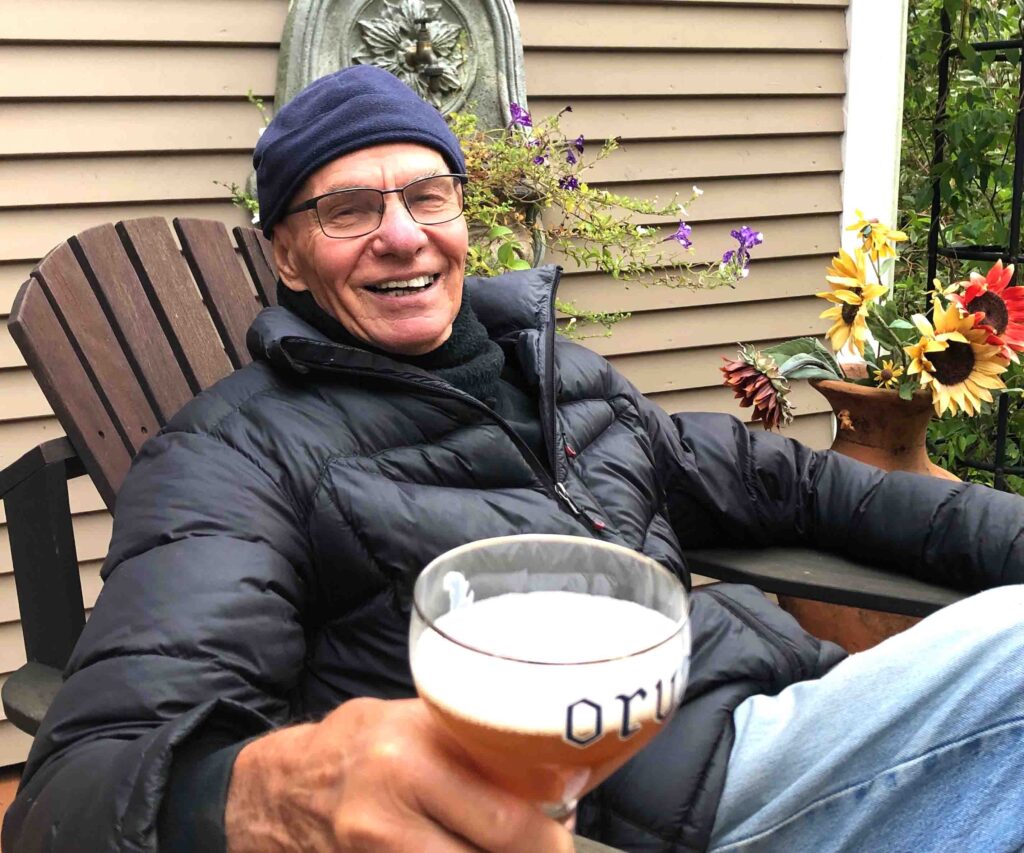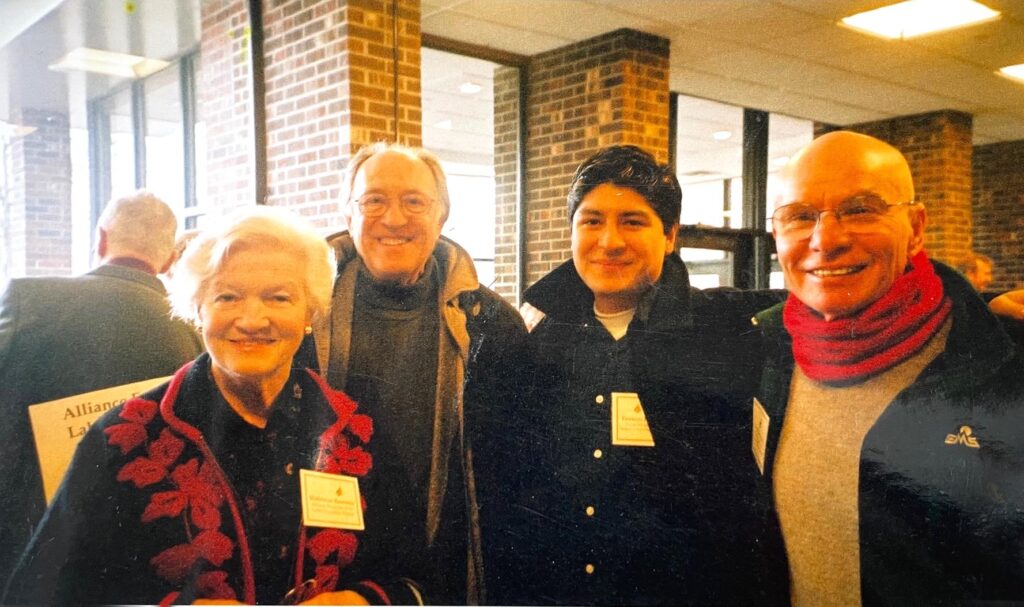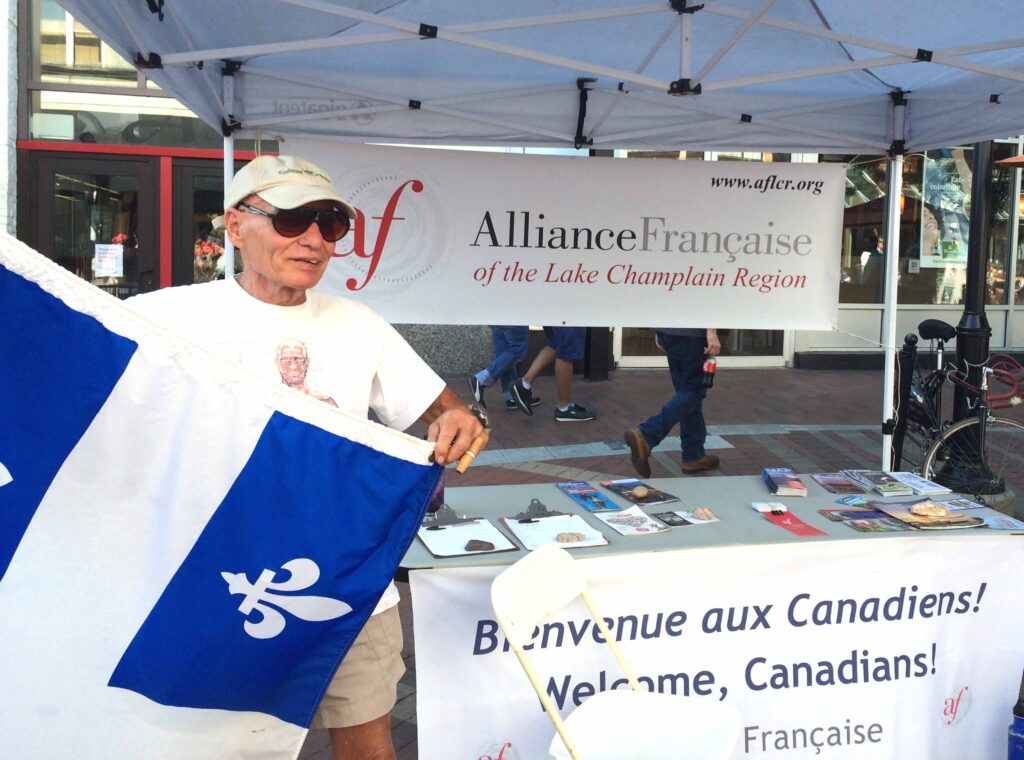
Dates: 1934 – 2021
Role at AFLCR: Board member from January 1999; organized conversation groups
Henry (Henri) Weinstock was born in 1934 in Antwerp, Belgium. His father, Eugene (Jenö) Weinstock, was a nonreligious Hungarian Jew. Eugene’s mother and siblings had emigrated to the United States and worked on bringing Eugene and Henry there as well. (Henry’s parents were divorced.) The paperwork was almost completed and tickets had been purchased to sail to New York. But before the documents were finalized, the Nazis invaded Belgium on May 10, 1940.
With the invasion, father and son set out to flee Belgium. They boarded a freight train to France. But the Germans bombed the tracks, so they and their fellow passenger-refugees got out and walked. As German planes flew overhead, they threw themselves facedown on the road, but the pilots slaughtered many around them. Eugene and Henry made it to the French border—but weren’t admitted because Eugene’s passport was Hungarian, and Hungary was considered an Axis power.
Painfully forced to turn back, they walked along the road amid corpses and overturned trucks. Strafed, they jumped into a ditch. They reached Middelkerk, on the seaside near Dunkirk, where they stayed for a while in an abandoned luxury hotel, hoping to somehow find a way across the English Channel. But when Nazis were about to arrive, they departed on foot, transporting an injured man in a wheelbarrow to Ghent, then made their way back to Antwerp.
They lived in their home city under Nazi occupation. Jews, increasingly restricted, had to register, then wear the Star of David. Jewish businesses had to put an identifying sign on the door.
Henry’s father Eugene was a skilled saboteur. He wanted to find work —and perform on-the-job sabotage—so he placed his son with a Jewish family in Brussels. In February 1941 Eugene went to France to work on German construction projects.
A Children’s Refugee Camp
But in the summer of 1942, Nazis raided the Jewish family in Brussels, so Eugene arranged for Henry to be cared for by another Jewish family. Then they too were raided. Every 2-3 months Eugene had to find another refuge for Henry as the protectors fell into Nazi hands. Finally he realized his son would never be safe with a Jewish family, so he placed him with a Christian Walloon family. Then Nazis started persecuting Christians who sheltered Jewish children.
A fellow resister referred Eugene to Abbé Edouard Froidure, a Catholic priest who ran a children’s camp. Froidure was a member of the Belgian resistance Starting in July 1941, he hid Jewish children, aged 5-12, ultimately about 100. He took Henry in, created a false birth certificate for him, and baptized him a Catholic.
That lasted 4 months. On October 9, 1942, the Gestapo arrested Froidure and broke up his children’s camp. (He was interned at Esterwegen, then at a prison in Bayreuth, then at Dachau. Froidure would survive the war and return to Brussels.)
Meanwhile after Froidure’s arrest, young Henry, now eight, was sheltered by the Comité de defense des juifs, an underground interfaith group affiliated with the Belgian Resistance. Founded in September 1942, it would ultimately save the lives of some 3,000 Jewish children.
Boarding School
Through the Comité, Henry was provided with a new name (Henri Albert Gérard) and taken to relative safely in a rural village called Jamoigne in southern Belgium. There an old castle had been converted to the Home Reine Elisabeth, a Catholic boarding school for the children of Belgian military families.
The boarding school was run by Emil Taquet, an officer in the Belgian army, and his wife Marie. When the Nazis overran Belgium in 1942, Emil had been assigned to direct the school. In 1942 it had 80 boys as students. Emil did the administrative work, while Marie was headmistress.
In 1943, another 80 Jewish children arrived, including Henry Weinstock. The Taquets hid them among the general student population. The Gestapo would raid, but Marie taught them to conceal their identities, and they survived. Together this husband and wife team saved 83 Jewish boys from the Holocaust.
But the boys had no contact with their parents, which was psychologically extremely difficult for them—it seemed to them that their parents had deserted them, and they could not understand why. In fact, the Nazis had arrested Eugene Weinstock and sent him to Buchenwald. Henry later said that the children could not allow themselves to imagine harm coming to their parents. If he and the his fellow students had known that their parents had been taken to the camps, “it would have driven us mad.” So “we all assumed they were safe.”
Henry stayed at the boarding school for 2-1/2 years. In December 1944 the Nazis launched an offensive in the densely forested Ardennes region, near the school. The boys witnessed part of the Battle of the Bulge, the last major German campaign on the Western Front. The fierce combat lasted five weeks, until January 1945.
Liberation and the Postwar Years
Soon after that came liberation. The boys, said Henry, “fought among ourselves to touch the first American soldier.” Through the Red Cross and a Christian friend, who had kept tabs on Henry during the war, Henry was reunited with his father, who had survived Buchenwald. in 1946 they were able to update their earlier immigration papers, so Eugene and Henry were among the first war refugees to arrive in the United States—they traveled on a Victory ship with homecoming U.S. soldiers. (Henry’s mother’s large family had been all killed, except for an uncle and three cousins who were later able to leave Europe as well.) Eugene Weinstock described what he had experienced in a book, Beyond the Last Path (1947).
From the age of 12, Henry grew up American. As a teenager in New York City, he worked odd jobs, as messenger, cabin boy, and taxi driver. Drafted into the U.S. Army during the Korean War, he served as an X-ray technician at a Hospital in Bad Kreuznach, Germany.
During leaves, he would jump onto a motor scooter and ride to Paris, where he discovered his love for French language and literature. And at a youth hostel in Denmark, he met Joanna Smith, whom he would marry in 1969. She would become a physician.
Henry studied at the Sorbonne in Paris, then at the City College of New York and at New York University. At SUNY Albany he completed a PhD in French literature. For many years he taught French, as well as English as a second language, at Rockland (New York) Community College.
In 1984 Henry, Joanna, and their two children moved to Jericho, Vermont. Henry worked as a tutor at the IBM French School in Essex Junction. The French government sponsored the school so that children of IBM workers from France could prepare for their French Baccalaureate exams. From 1986 to 1997 he commuted to again teach French and ELS at Rockland. Every semester he would take his students on a trip to Quebec City.
In 1987, on a visit to the IBM families in France, Henry took his family on a detour to Jamoigne to show them where he had been sheltered during the war. At the parish church where he had served as an altar boy, they met a couple of elderly women who realized that he must have been one of the hidden children. They put him in touch with some of the other hidden children, who were in the midst of planning a reunion to honor their former teachers, counselors, and Mme Marie Taquet, the beloved headmistress who had cared for them.
At that 1988 reunion in Jamoigne, and at another in New York in 1991, Henry met many of the survivors from Home Reine Elisabeth and members of the Comité de defense des juifs who had hidden them. “No language would articulate what we shared,” he said afterward. “Most of us had lost their families. Few found family, so we were surrogate family to each other. We’d touch each other but couldn’t talk. Certain experiences are beyond description, beyond articulation.”
Retirement and AFLCR
After his retirement in 1997, Henry enjoyed listening to opera and classical music, chopping firewood, tinkering with his vegetable-oil-fueled truck, and reading French philosophy. He loved meeting people. Above all, he loved bicycling, often taking “century” rides to Québec, where he could speak French.
Around 1999 Henry met Simon Barenbaum, another Holocaust survivor, who brought him into the nascent Alliance Française in Burlington. He relished the camaraderie and the social events, especially the musical soirées. He enjoyed chairing the conversation group committee. He started French conversation groups wherever he went, most notably in the arctic village of Kotzebue, Alaska, and in Juneau, where he accompanied Joanna in her work as a doctor; and in his final years at the Deborah Rawson Memorial Library in Jericho.
Henry also volunteered at a tent on Church Street, sponsored initially by the Church Street Marketplace and later the AFLCR, to welcome visitors from Québec.
Like Simon, Henry was committed to sharing his wartime experiences in high schools, to promote dialogue, understanding, and compassion among young people. His advice to future generations: “Do away with convictions that will do harm to others.”
Henry Weinstock, age 87, passed away at his home in Jericho on October 2, 2021, surrounded by family.
Many thanks to Joanna Weinstock for reviewing, correcting, and adding to this article and for providing the photos of her late husband.
Janet Biehl

